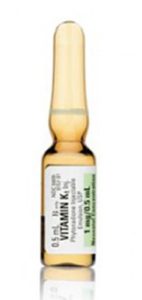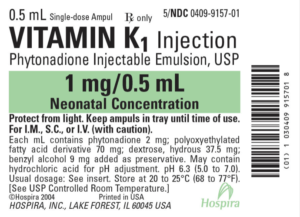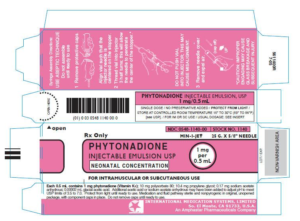 Many parents find they are being pushed to accept the vitamin K shot for their newborn. A variety of claims are made by health care professionals, including “It’s just a vitamin” and “Your baby could die without the shot.” Parents are rightfully concerned. No parent wants to inflict harm on their baby, or deprive them from a life-giving procedure. But is vitamin K absolutely safe and absolutely necessary? Is there anything safer?
Many parents find they are being pushed to accept the vitamin K shot for their newborn. A variety of claims are made by health care professionals, including “It’s just a vitamin” and “Your baby could die without the shot.” Parents are rightfully concerned. No parent wants to inflict harm on their baby, or deprive them from a life-giving procedure. But is vitamin K absolutely safe and absolutely necessary? Is there anything safer?
There are two versions of vitamin K given to newborns. One contains a preservative benzoyl alcohol and one contains polysorbate 80. These ingredients are of particular concern for those investigating the safety of this injection. “Polysorbate 80 is a surfactant known to facilitate access through the blood brain barrier and has been linked to sterility and other issues.” Benzoyl alcohol could contribute to neonatal jaundice.
Version 1: The following information comes directly from the manufacturer’s information sheet for phytonadione by Hospira, Inc. which you can find in full HERE. Notice that this product contains 9 mg of benzoyl alcohol.
Pediatric Use
Hemolysis, jaundice, and hyperbilirubinemia in neonates, particularly those that are premature, may be related to the dose of Vitamin K1 Injection. Therefore, the recommended dose should not be exceeded (see ADVERSE REACTIONS and DOSAGE AND ADMINISTRATION).
 Adverse Reactions
Adverse Reactions
Deaths have occurred after intravenous and intramuscular administration. (See Box Warning.)
Transient “flushing sensations” and “peculiar” sensations of taste have been observed, as well as rare instances of dizziness, rapid and weak pulse, profuse sweating, brief hypotension, dyspnea, and cyanosis.
Pain, swelling, and tenderness at the injection site may occur.
The possibility of allergic sensitivity including an anaphylactoid reaction, should be kept in mind.
CONTRAINDICATION
Hypersensitivity to any component of this medication.
Warnings
Benzyl alcohol as a preservative in Bacteriostatic Sodium Chloride Injection has been associated with toxicity in newborns. Data are unavailable on the toxicity of other preservatives in this age group. There is no evidence to suggest that the small amount of benzyl alcohol contained in Vitamin K1 Injection (Phytonadione Injectable Emulsion, USP), when used as recommended, is associated with toxicity.
Link to complete drug insert: https://www.drugs.com/pro/vitamin-k1.html
Version 2: The ‘preservative free’ version is manufactured by International Medication Systems, Limited and contains 10 mg of polysorbate 80.
The complete description with warnings and adverse events can be found here.
There is particular concern about the administration of either vitamin K shot prior to giving the newborn the CDC recommended Hepatitis B vaccine. There are many aspects of routine newborn care which have not been studied to determine if the combination could be dangerous or cause a reaction when given together. Please research every standard of care procedure for your precious baby to make sure it has been proven to be SAFE.
“Vaccines can have adverse side-effects, and these are predominantly associated with the inclusion of chemical additives such as aluminum hydroxide adjuvant. The objective of this study was to establish an in vitro model system amenable to mechanistic investigations of cytotoxicity induced by hepatitis B vaccine…” Hepatitis B vaccine induces apoptotic death in Hepa1–6 cells, Apoptosis, An International Journal on Programmed Cell Death
http://link.springer.com/article/10.1007%2Fs10495-011-0690-1
What if the administration of the vitamin K shot containing polysorbate 80 provides greater permeability to the infant brain so that the aluminum contained in the Hepatitis B vaccine can cause greater damage? This is just a question. But these questions need answers.
Some perspective on the vitamin K injection by Theo Farmer . . . .
I’d like to provide some perspective on the use of the vitamin K shot with babies. In particular, when a doctor says “there is a chance your baby will bleed to death if they don’t get this shot…,” what does that mean?
If you study the attached paper [1] for a while, it seems to me that it boils down to this: if you don’t take vitamin K inhibiting drugs when you’re pregnant and your baby is adequately breastfed, then the chance of them developing a bleeding disorder is 1/15,000 or maybe 1/20,000. There are other factors mentioned, like the incidence goes up if the baby is not adequately fed, but if you’re healthy and the baby is healthy and eating, doctors can still say “there’s a chance” when there is a 1 in 20,000 chance. Also, the paper is ambiguous about how many cases are mild cases and how many result in damage to the child.
To put into perspective the chance “1 in 20,000”: if you had a room in a clinic where one baby was born per day, every baby born in that room for 54 years would be given a vitamin K shot in order to prevent a bleeding disorder in just one baby.
With this 54 year perspective in mind, parents should ask themselves these kinds of questions: in 54 years of giving vitamin K shots, how many of those shots will cause problems? How many will be contaminated in manufacturing? What are the other ingredients besides Vitamin K and what is the chance they cause issues? What are the complications that arise simply by poking babies with needles for 54 years? Are there psychological implications to the child later in life? And then the best question: is there a valid reason that human babies are born deficient in vitamin K (God doesn’t make mistakes)?
And all this leads to a pivotal question: If this doctor has been taught to push this shot for every baby for 54 years to prevent one from excessive bleeding, can he be trusted in general?From Wikipedia: “Lies, damned lies, and statistics” is a phrase describing the persuasive power of numbers, particularly the use of statistics to bolster weak arguments.”
Is there anything safer than vitamin K to protect a baby from brain bleeds?
Dr Suzanne Humphries explains clearly how the biggest factor involved in the vitamin K debate is the necessity of delayed cord clamping. When a baby’s cord is clamped immediately, it deprives baby of up to 1/3 of their total blood volume. By allowing the cord to stay attached at least until it stops pulsating, the baby receives all the blood they need. Additionally, baby receives essential stem cells which can move through the blood and initiate repair to any cells damaged from birth trauma. The stem cells are a brilliant heritage for baby and will contribute to longterm health. Stem cell therapy is a cutting edge field. Parents are often encouraged to harvest stem cells at the time of birth. Yet, very few doctors understand or explain to parents that the best heritage they can give their baby at birth is DELAYED CORD CLAMPING and successful breastfeeding. Additionally, mom can supplement her own vitamin K during pregnancy and after, by eating foods that supply this essential nutrient.
Edited to add: If you decide you want to give vitamin K order the liquid form. Take it to the hospital with you. Even if you decide NOT to give any vitamin K and you are birthing in a hospital, it might be a good idea to have the liquid form with you to appease those who are pushing you. Whether you give it or not, you can explain that you have the liquid version and you prefer to use that.
Let’s research and get the FACTS so that we can make informed decisions for the longterm health of our precious babies. More info on vitamin K here and here.
 Author: Becky Hastings, wife to John for 36 years, mother of five naturally born breastfed babies, grandmother of six, passionate follower of Jesus and truth. As a volunteer breastfeeding counselor since 1993, Becky is devoted to helping parents, especially mothers, make wise decisions for the long-term health and wellbeing of their babies.
Author: Becky Hastings, wife to John for 36 years, mother of five naturally born breastfed babies, grandmother of six, passionate follower of Jesus and truth. As a volunteer breastfeeding counselor since 1993, Becky is devoted to helping parents, especially mothers, make wise decisions for the long-term health and wellbeing of their babies.
[1] Lippi, Giuseppe, and Massimo Franchini. “Vitamin K in Neonates: Facts and Myths.” Blood Transfusion, Edizioni SIMTI – SIMTI Servizi Srl, Jan. 2011, www.ncbi.nlm.nih.gov/pmc/articles/PMC3021393/. Accessed 4 November 2017.



Pingback: Warning Signs | Journey Boost
Pingback: What’s in Vitamin K??? | Journey Boost
Pingback: Vitamin K at Birth? | Journey Boost
It says contraindicated if there is any allergy to any component in the shot. How would you know that with a one day old baby?
Exactly. And, how many nurses who administer this shot have even read that warning? How many parents receive full informed consent?
We need to keep getting the word out. Medical care doesn’t care.
Becky